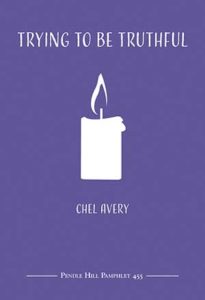Trying to Be Truthful
Reviewed by Tom Paxson
September 1, 2019
By Chel Avery. Pendle Hill Pamphlets (number 455), 2019. 30 pages. $7/pamphlet.
Buy from QuakerBooks Reflections on trying to be truthful are particularly timely in this era when truthfulness is so often pushed aside for competing factors, whether they be loyalty to a cause, entertainment, shock value, self-deception, manipulating others, or an endless number of other purposes. In this pamphlet the journey toward truthfulness we are invited and encouraged to follow is a spiritual journey, not an academic, journalistic, or political one. It is deeply rooted in traditional Quaker concerns pursued in the context of today’s combative, ideological, and manipulative discourse and conduct. Fittingly enough, Chel Avery looks for seeds of dishonesty in ourselves and in our perception of the costliness of truthfulness—which, she argues, we often exaggerate. Nor are temptations to deceive left unexamined. The focus of this essay is a spiritual journey to wholeness.
Reflections on trying to be truthful are particularly timely in this era when truthfulness is so often pushed aside for competing factors, whether they be loyalty to a cause, entertainment, shock value, self-deception, manipulating others, or an endless number of other purposes. In this pamphlet the journey toward truthfulness we are invited and encouraged to follow is a spiritual journey, not an academic, journalistic, or political one. It is deeply rooted in traditional Quaker concerns pursued in the context of today’s combative, ideological, and manipulative discourse and conduct. Fittingly enough, Chel Avery looks for seeds of dishonesty in ourselves and in our perception of the costliness of truthfulness—which, she argues, we often exaggerate. Nor are temptations to deceive left unexamined. The focus of this essay is a spiritual journey to wholeness.
Avery notes at the outset of Trying to Be Truthful that, as it seems to her, “each of us is given a ‘starting place’” for their own individual journeys, and hers has been truth. Mine is different, but it has led me on a path intersecting hers, and hers will very likely intersect those of many readers of Friends Journal, whatever their starting places may be. The truth she seeks is much deeper than propositional truth, the accurate correspondence of a statement with a state of affairs in the real world; the truthfulness with which she is concerned has more to do with care to avoid creating false or misleading impressions, care to avoid deception—whether of others or of oneself. Even more fundamentally, it is a journey toward a wholeness free of self-deception. An awareness of the mechanisms by which we deceive ourselves and are tempted to deceive others facilitates the journey: the ways in which one’s social status, physical being, imagination, desires, and fears (to name a few) shape our inclinations to form beliefs about ourselves, others, and our environment. We are innately capable of deception and indeed led to deceptive behavior through such basic impulses as fight, flight, or freeze. Recognizing the reality of this human condition prompts Avery to ask herself how we can navigate the schism between our “hard-wiring” and Quaker truth. She offers in reply the constructive roles played by love, self-acceptance, and kindness in the journey toward being truthful.
Trying to be truthful, Avery shows, is always a journey, not least because the inward and the outward dimensions of the journey are inherently interconnected and we ourselves are always changing along with our circumstances. As a consequence, what truthfulness requires of us must also change apace. For example, the stories through which we understand ourselves, our family, our friends, and our communities must change concomitantly, lest we fall into self-deception. In this and other thought-provoking reflections Avery emphasizes the limitations of our changing understandings (and even more our frozen understandings), the need for cognitive humility, and the prevalence of a misguided self-protection as an underlying stimulus to deceive.
There is hardly a page that has not led me to further reflection. The discussion questions at the end are useful prompts for group discussion and also valuable aids for the inner work of interrogating one’s own progress toward truthfulness.
I was saddened to learn, after drafting this review, that Chel Avery died October 12, 2018. I had hoped very much to meet her, but remain indebted to her for sharing with us this journey of “trying to be truthful.”



Comments on Friendsjournal.org may be used in the Forum of the print magazine and may be edited for length and clarity.